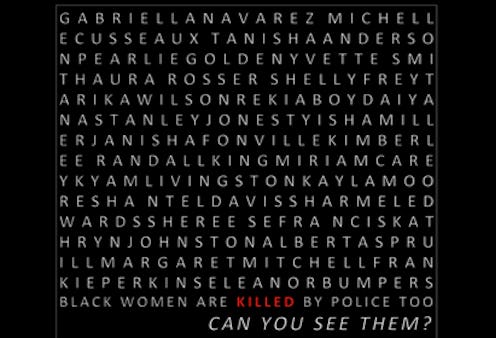News
A Look At Police Brutality Against Black Women

A new report shines a light on an often overlooked aspect of race and law enforcement. #SayHerName shares stories of black women and police brutality, focusing on those killed by officers and facing gender-specific abuses such as sexual assault.
In the wake of a recent surge of awareness of police violence against black men, #SayHerName brings the untold stories of black women's death and sexual assault at the hands of police to the forefront. You've heard of Michael Brown, Tamir Rice, and Eric Garner. But what about Gabriella Navarez, Aura Rosser, Michelle Cusseaux, or Tanisha Anderson? They, like their male counterparts, were black and killed by police in 2014. But their deaths haven't dominated headlines.
The report was released Thursday through partnership between the African American Policy Forum, Columbia University's Center for Intersectionality and Social Policy Studies, and Soros Justice Fellow Andrea Richie. Kimberle Williams Crenshaw, director of the African American Policy Forum, said in a statement:
Although Black women are routinely killed, raped and beaten by the police, their experiences are rarely foregrounded in popular understandings of police brutality. Yet, inclusion of Black women’s experiences in social movements, media narratives and policy demands around policing and police brutality is critical to effectively combating racialized state violence for Black communities and other communities of color.
The authors note in the brief that they do not intend to keep a catalog of every death or abuse of a black woman by police. They called it an "impossible" task, citing the lack of information or databases kept that accurately logs police killings and sexual abuse of black women. Rather, the authors want black women to be a part of the conversation.
Given these limitations, our goal was simply to illustrate the reality that Black women are killed and violated by police with alarming regularity. Equally important, our hope is to call attention to the ways in which this reality is erased from our demonstrations, our discourse, and our demands, to broaden our vision of social justice.
A day before the report came out, the African American Policy Forum organized a vigil in New York City's Union Square, and demonstrations later popped up in California, as well. But like the #BlackLivesMatter movement, which focused largely on police brutality against black boys and men, #SayHerName really found its home on Twitter. Here are some of the #SayHerName tweets that brought attention to the fact that black women face disproportionate violence, too.
Images: African American Policy Forum (1), Getty Images (1)